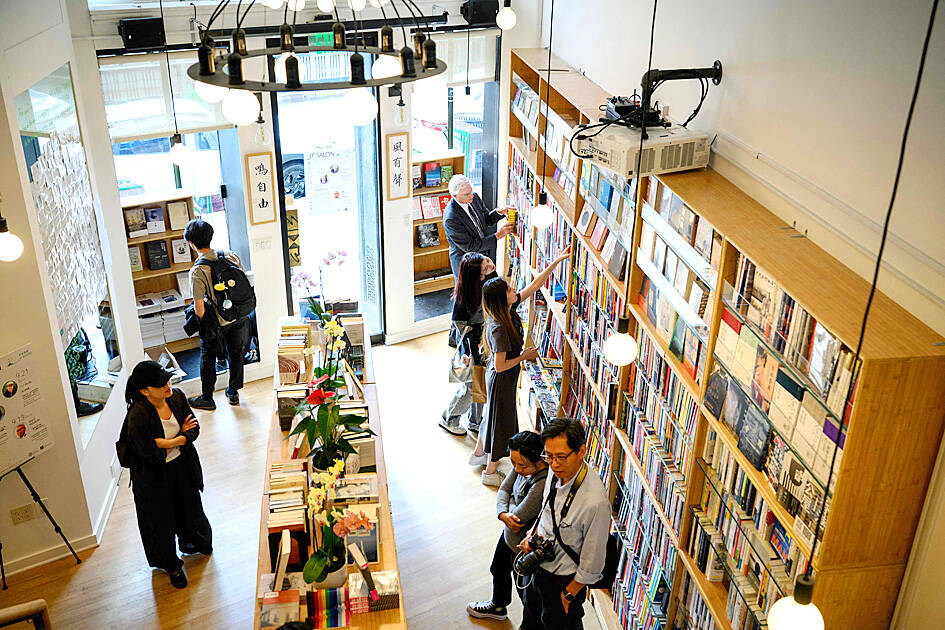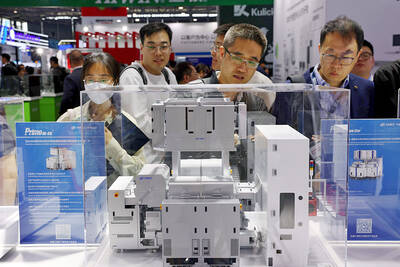From talks on social issues to topics such as constitutionalism and religion, bookseller Yu Miao (于淼) wanted Jifeng Bookstore (季風書園) in Shanghai to be a place for public discussions.
“But some topics are considered taboo and sensitive to discuss in public spaces,” he said, of the store that was effectively forced out of business in China in January 2018.
Years later, Jifeng has started a new chapter as JF Books in Washington, a rare source of Chinese-language volumes in the US capital, covering everything from sociology to China studies.

Photo: AFP
The bookstore originated in China in 1997, with up to eight outlets in cosmopolitan Shanghai at its peak.
However, as Beijing tightened restrictions on booksellers and academics over the past decade, the store came under heightened scrutiny.
Authorities posed obstacles to organizing events on topics such as feminism, constitutionalism and religion — sometimes notifying the store that certain seminars had to be canceled.

Photo: AFP
“We didn’t want to have any taboo topics or self-limitations,” Yu said, adding that subjects were chosen for their importance.
The store did not allow its decisions to be affected by concern over potential interference, added Yu, who took over the business from its founder in 2012.
He said he was delighted that most people attending the seminars were young.
However, Jifeng came under increasing pressure to cancel events, and in 2017 it had trouble renewing its lease.
“You realize that your space for survival is shrinking,” Yu said.
In those years, other publications, independent media and cultural institutions also shuttered amid scrutiny, he added.
In 2016, China shut down several online operations for independently reporting and publishing articles about potentially sensitive subjects.
Some of the freewheeling political and social news sites of Sina Corp (新浪), Sohu.com Ltd (搜狐), NetEase Inc (網易) and Phoenix Media Investment (Holdings) Ltd (鳳凰衛視) were closed, state media reported at the time.
On one of the last days of Jifeng’s Shanghai operations, people were in the store when its power was cut.
“I think the power outage was also to prevent people from gathering,” Yu said.
Instead of leaving, patrons lit up their mobile phones and put up battery-powered lights, casting a hazy glow over the space.
“People read poetry, sang, strummed the guitar and played the piano,” Yu said. “More readers heard the news and came to join us. It was a moving moment.”
Photographs from that evening are displayed on JF Books’ brightly lit storefront in Washington, while handwritten cards from patrons of the Shanghai store remain displayed by its entrance.
After Jifeng’s closure, Yu moved to the US with his wife and their children, furthering his studies.
With the family planning to stay in the country for longer, opening another bookstore was a natural choice for Yu.
“My desire to participate in society came together with my inner regret,” he said, referring to his wistfulness over Jifeng’s closure.
Realizing it was tough to find Chinese-language books in Washington, even online, Yu figured that opening a bookstore could fulfil the needs of readers like himself.
In addition to Chinese-language volumes, the store carries English titles with a focus on Chinese and Asian issues, alongside Asian authors’ works.
“Besides books from mainland China, we can also procure books published in Taiwan and Hong Kong,” Yu said. “This was hard to imagine when we were running a bookstore in Shanghai.”
Many such books are not available in mainland Chinese stores due to strict controls.
Yu has faced other difficulties in the past few years: After a visit to China, his wife was temporarily unable to leave, an experience he called “a nightmare.”
Now, “we really cherish being able to live together freely and without fear,” he said.
Like its predecessor in Shanghai, Yu wants JF Books to be a space where people come together — to buy books or attend seminars and cultural activities.
Already, three talks it is organizing this month, including one with Chinese-American poet Ha Jin (哈金), are fully subscribed.
“It feels very nice to have a bookstore of Chinese books in” Washington, said Rayna Zhang, 35, who visited the shop after reading about it on social media.
“I think it’s also a way of helping us keep up with the trends, the culture of young people back home,” added Zhang, who is Chinese.
Another patron, 36-year-old William Au, echoed that sentiment.
“I just find it fun that a place that seemed so prominent in the community out of Shanghai” is suddenly here, he said.

With this year’s Semicon Taiwan trade show set to kick off on Wednesday, market attention has turned to the mass production of advanced packaging technologies and capacity expansion in Taiwan and the US. With traditional scaling reaching physical limits, heterogeneous integration and packaging technologies have emerged as key solutions. Surging demand for artificial intelligence (AI), high-performance computing (HPC) and high-bandwidth memory (HBM) chips has put technologies such as chip-on-wafer-on-substrate (CoWoS), integrated fan-out (InFO), system on integrated chips (SoIC), 3D IC and fan-out panel-level packaging (FOPLP) at the center of semiconductor innovation, making them a major focus at this year’s trade show, according

DEBUT: The trade show is to feature 17 national pavilions, a new high for the event, including from Canada, Costa Rica, Lithuania, Sweden and Vietnam for the first time The Semicon Taiwan trade show, which opens on Wednesday, is expected to see a new high in the number of exhibitors and visitors from around the world, said its organizer, SEMI, which has described the annual event as the “Olympics of the semiconductor industry.” SEMI, which represents companies in the electronics manufacturing and design supply chain, and touts the annual exhibition as the most influential semiconductor trade show in the world, said more than 1,200 enterprises from 56 countries are to showcase their innovations across more than 4,100 booths, and that the event could attract 100,000 visitors. This year’s event features 17

Germany is to establish its first-ever national pavilion at Semicon Taiwan, which starts tomorrow in Taipei, as the country looks to raise its profile and deepen semiconductor ties with Taiwan as global chip demand accelerates. Martin Mayer, a semiconductor investment expert at Germany Trade & Invest (GTAI), Germany’s international economic promotion agency, said before leaving for Taiwan that the nation is a crucial partner in developing Germany’s semiconductor ecosystem. Germany’s debut at the international semiconductor exhibition in Taipei aims to “show presence” and signal its commitment to semiconductors, while building trust with Taiwanese companies, government and industry associations, he said. “The best outcome

Semiconductor equipment billings in Taiwan are expected to double this year, as manufacturers in the industry are keen to expand production to meet strong global demand for artificial intelligence applications, according to SEMI, which represents companies in the electronics manufacturing and design supply chain. Speaking at a news conference before the opening of Semicon Taiwan trade show tomorrow, SEMI director of industry research and statistics Clark Tseng (曾瑞榆) said semiconductor equipment billings in Taiwan are expected to grow by an annual 100 percent this year, beating an earlier estimate of 70 percent growth. He said that Taiwan received a boost from a